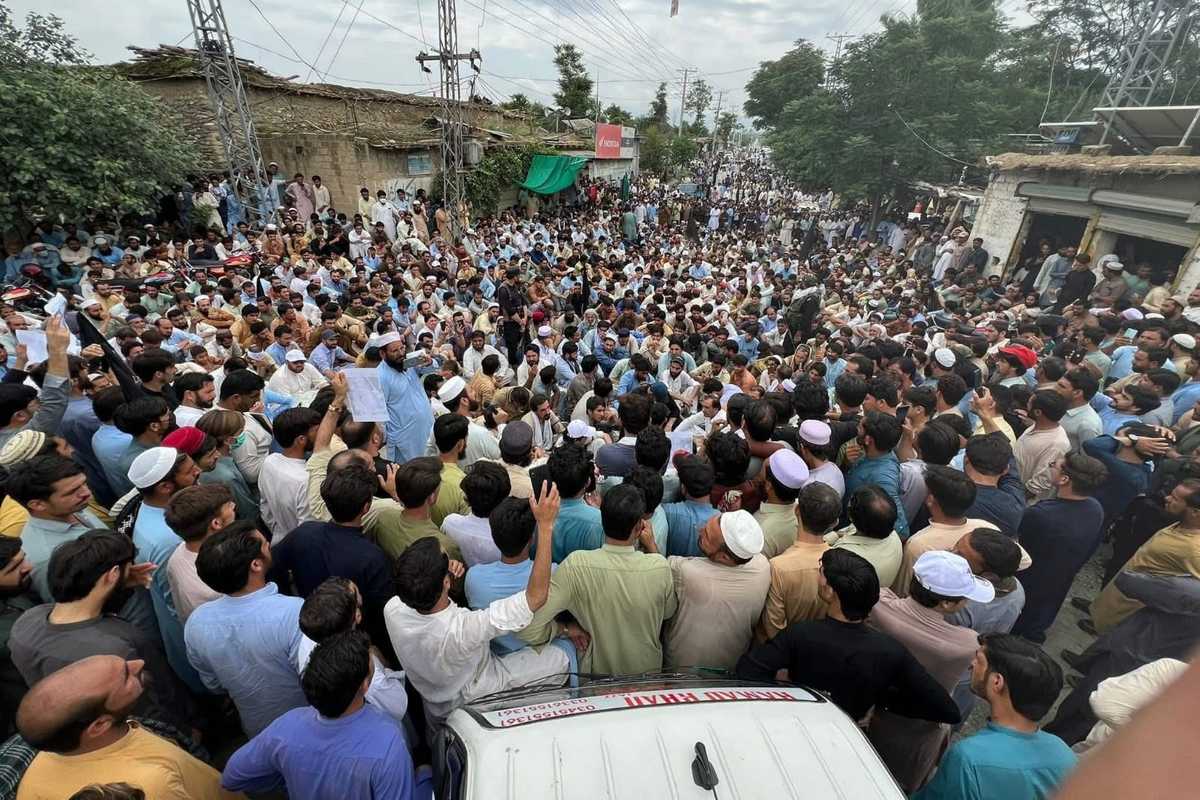Pakistan halts military operation in Bajaur amid protests; curfew remains in villages
CM Gandapur slams failed security policies, vows swift action against militants based on credible intelligence

Kamran Ali
Correspondent Nukta
Kamran Ali, a seasoned journalist from Khyber Pakhtunkhwa, Pakistan, has a decade of experience covering terrorism, human rights, politics, economy, climate change, culture, and sports. With an MS in Media Studies, he has worked across print, radio, TV, and digital media, producing investigative reports and co-hosting shows that highlight critical issues.

Residents of Bajaur stage a protest at Umari Chowk against the military campaign on Wednesday, July 30, 2025.
Nukta
Pakistan’s military has temporarily paused its counter-terrorism operation in Bajaur, a tribal district in northwestern Khyber Pakhtunkhwa province, following widespread protests by local political and tribal leaders just a day after the campaign was launched.
Residents of Bajaur staged a protest at Umari Chowk against the military campaign, locally known as the "Sarbakaf Operation." Protesters denounced curfews and what they called “foreign-funded wars.”

Former Pakistan Tehreek-e-Insaf (PTI) lawmaker Gul Zafar addressed the crowd, saying demonstrators would carry the Holy Quran as a symbolic plea to all parties to end civilian suffering.
Despite the pause in military activity, a strict curfew remains in place across 16 villages in Loe Mamund tehsil, after an official notification issued yesterday by the Deputy Commissioner. All movement is prohibited in the area.
Dr. Saleem Shah, Deputy Medical Superintendent at the District Headquarters Hospital, told Nukta that three civilians, including two men and a 14-year-old girl, were brought in dead. Eleven others were injured, including two young girls and two women. One critically wounded person was transferred to a hospital in Peshawar for treatment, he said.
Locals said the curfew had stranded many families. With no vehicles available, women and children were seen walking on foot to leave the area.
The curfew affects the villages of Bad-e-Siah, Tarkho, Irab, Gat, Agra, Khurchai, Dawaqai, Kalan, Legharai, Kitkot, Gillai, Nakhtar, Zarai, Dambarai, Amanata, and Zagai. Officials stated that the restrictions would remain in place until July 31, unless they are lifted or extended.
'Weakened public trust'
Following the operation, Khyber Pakhtunkhwa Chief Minister Ali Amin Gandapur chaired a high-level security meeting attended by the Chief Secretary, Inspector General of Police, and other senior officials.
Gandapur extended condolences to the families of civilians and security personnel killed during the operation. He announced financial compensation of PKR 10 million for each of the deceased and PKR 2.5 million for the injured.
The chief minister expressed concern that such incidents weaken public trust in the armed forces.
“These events damage the trust between the people and the armed forces,” he said. Gandapur criticized what he described as failed security policies that had undermined the military’s dignity.
He pledged to convene a grand tribal jirga to address the situation and instructed authorities that no future curfews be imposed without prior approval from the Home Department.
CM Gandapur also chaired a meeting of the provincial Apex Committee to assess the security situation in the tribal districts, with a particular focus on Bajaur, Khyber, and North Waziristan.
The meeting was attended by senior civil and military officials, including the Peshawar Corps Commander, Chief Secretary, Inspector General of Police, and lawmakers from the affected areas.
In a joint statement, the committee described terrorism as a "malignant threat" that requires a unified response.
Later, in a video message, Gandapur clarified that no military operation is currently planned, nor will any be permitted. However, he said targeted action will be taken in response to credible reports of militant presence.
Demand for peace
A jirga of tribal elders and political leaders was later convened at the Bajaur Scouts headquarters, where members agreed to a temporary ceasefire with militants until Thursday.
The ceasefire was decided as part of an effort to de-escalate tensions and pave the way for negotiations. According to officials, the jirga also resolved to hold talks with the Tehreek-e-Taliban Pakistan (TTP). The truce will remain in place until the next round of negotiations is concluded.
As part of the agreement, the use of mortar fire in civilian areas will be halted. While the daytime curfew will be relaxed, the night-time curfew will remain in effect.
Participants in the jirga included prominent tribal elders Malik Nasir, Malik Burhan, and Malik Muzaffar, former MNA Gul Zafar, Deputy Commissioner Shahid Ali, District Police Officer Waqas Rafiq, and senior officials from the Bajaur Scouts.
Last week, five civilians were killed and 16 others wounded when gunfire broke out during protests in the Tirah Valley in Khyber district. The demonstrations began after a young girl was reportedly killed in a suspected mortar shell strike.
Public outrage over her death led residents to march toward key security posts. Protesters first gathered at the Momand Ghwas checkpoint, where they placed the girl’s body as a form of protest. The group later moved to the Bagh area near the Brigade Headquarters, where the shooting occurred.
Security officials said the protest initially remained peaceful, with residents expressing legitimate concerns. However, they claimed militants later infiltrated the crowd and opened fire.
Earlier this week, thousands from Tirah Valley marched toward suspected militant hideouts, demanding that armed groups withdraw and peace be restored in the region.
The march followed a grand jirga of the Bar Qamber Khel tribe. Tribal elders led thousands of men, women, and children from Bagh to the Botan area, where TTP is believed to be hiding.
Holding up copies of the Holy Quran, protesters made a symbolic appeal for the militants to leave without violence.
Tribal elder Zahir Shah Afridi voiced the community’s demand for peace.
“We have risen against oppression. Even if they kill us, we will not back down,” he said.







Comments
See what people are discussing